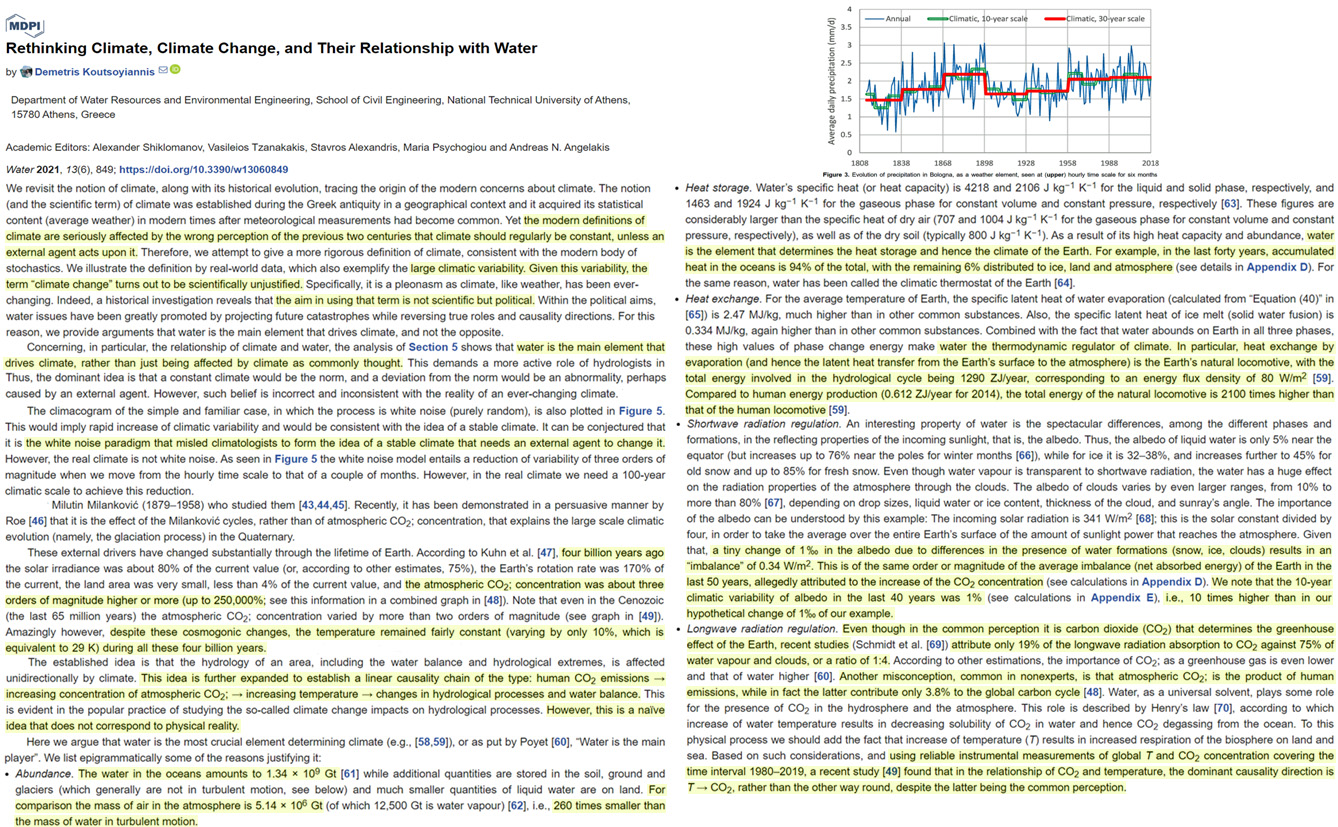Paradigm-Busting New Study Affirms CO2 Doesn’t Drive Climate – Water, Clouds Do
Paradigm-Busting New Study Affirms CO2 Doesn’t Drive Climate – Water, Clouds Do
A professor of hydrology from the University of Athens eviscerates the “naïve” paradigm that says the natural state of Earth’s climate is constancy and stability, only changing when an “external agent” (i.e., a rapid increase in fossil fuel emissions ) acts upon it. Instead, (a) water is the main element driving climate and (b) the alleged human contribution to heat exchange is 2100 times smaller than Earth’s natural energy fluxes.

Koutsoyiannis, 2021
Selected key points from Dr. Koutsiannis’ new paper in the journal Water.
1. The “naïve idea” or “wrong perception” that climate is generally constant unless an external agent changes it is the consequence of the “white noise paradigm” that has “misled climatologists” for the last two centuries. The “linear causality chain of the type: human CO2 emissions → increasing concentration of atmospheric CO2 → increasing temperature → changes in hydrological processes and water balance” does not “correspond to physical reality”.
2. The scientifically vacuous term “climate change” is a political construct designed to suggest climate variability has not occurred until last few centuries and therefore what is occurring in the modern era is unnatural.
3. Water is easily the main element driving Earth’s climate. CO2 is but a tiny bit player by comparison.
• The mass of the ocean is 260 times greater than the mass of the atmosphere and the ocean encapsulates 94% of the Earth’s accumulated heat energy (versus just 1% for the atmosphere). This is why water is the “thermodynamic regulator of climate”.
• Latent heat transfer from the surface to atmosphere is described as “the Earth’s natural locomotive”. The total energy involved in Earth’s hydrological cycle amounts to 1290 ZJ/year. Compare this to just 0.6 ZJ/year for the “human energy production” from greenhouse gas emissions. Therefore, the “natural locomotive is 2100 times higher than that of the human locomotive”.
• A hypothetical 1/1000ths (1‰) change in the reflecting properties (albedo) of the water formations snow, ice, and clouds elicits an “imbalance” in the Earth’s energy budget of 0.34 W/m². This is effectively equivalent to the energy imbalance necessary to explain the 0.1°C ocean warming (0-2000 m) in the last 50 years (Levitus et al., 2012). Actually , in the last 40 years, albedo-forcing from cloud variability was 10 times greater than the hypothetical 1‰ change.
4. “Another misconception, common in nonexperts, is that atmospheric CO2; is the product of human emissions, while in fact the latter contribute only 3.8% to the global carbon cycle.”
5. “[U]sing reliable instrumental measurements of global T and CO2 concentration covering the time interval 1980–2019, a recent study found that in the relationship of CO2 and temperature, the dominant causality direction is T → CO2, rather than the other way round, despite the latter being the common perception.”
Comments
Post a Comment